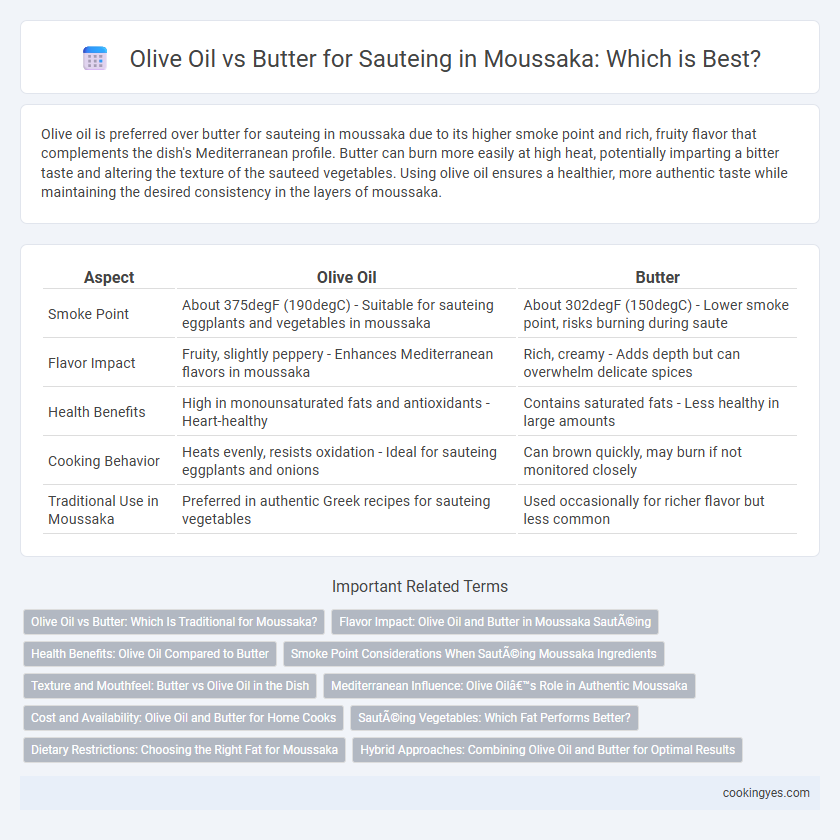Olive oil is preferred over butter for sauteing in moussaka due to its higher smoke point and rich, fruity flavor that complements the dish's Mediterranean profile. Butter can burn more easily at high heat, potentially imparting a bitter taste and altering the texture of the sauteed vegetables. Using olive oil ensures a healthier, more authentic taste while maintaining the desired consistency in the layers of moussaka.
Table of Comparison
| Aspect | Olive Oil | Butter |
|---|---|---|
| Smoke Point | About 375degF (190degC) - Suitable for sauteing eggplants and vegetables in moussaka | About 302degF (150degC) - Lower smoke point, risks burning during saute |
| Flavor Impact | Fruity, slightly peppery - Enhances Mediterranean flavors in moussaka | Rich, creamy - Adds depth but can overwhelm delicate spices |
| Health Benefits | High in monounsaturated fats and antioxidants - Heart-healthy | Contains saturated fats - Less healthy in large amounts |
| Cooking Behavior | Heats evenly, resists oxidation - Ideal for sauteing eggplants and onions | Can brown quickly, may burn if not monitored closely |
| Traditional Use in Moussaka | Preferred in authentic Greek recipes for sauteing vegetables | Used occasionally for richer flavor but less common |
Olive Oil vs Butter: Which Is Traditional for Moussaka?
Olive oil is the traditional fat used for sauteing in moussaka, enhancing the dish with its rich Mediterranean flavor and health benefits such as antioxidants and monounsaturated fats. Butter, while offering a creamy texture, is less authentic and can change the characteristic taste profile of classic Greek moussaka. Authentic recipes prioritize olive oil to maintain the dish's cultural integrity and its well-balanced flavor.
Flavor Impact: Olive Oil and Butter in Moussaka Sautéing
Olive oil imparts a fruity, slightly peppery flavor that enhances the Mediterranean essence of moussaka, while butter adds a rich, creamy note that deepens the savory profile of the sauteed ingredients. The choice between olive oil and butter influences the dish's aroma and mouthfeel, with olive oil offering a lighter, more vibrant taste and butter providing a luscious, indulgent finish. For authentic Greek moussaka, extra virgin olive oil is preferred to maintain traditional flavor authenticity and complement layers of eggplant, ground meat, and bechamel sauce.
Health Benefits: Olive Oil Compared to Butter
Olive oil contains monounsaturated fats and antioxidants that support heart health and reduce inflammation, making it a healthier option for sauteing in moussaka compared to butter, which is high in saturated fats linked to increased cholesterol levels. The presence of polyphenols in olive oil also offers anti-inflammatory and anti-cancer properties absent in butter. Using olive oil enhances the nutritional profile of moussaka while contributing to better cardiovascular health.
Smoke Point Considerations When Sautéing Moussaka Ingredients
Olive oil offers a moderate smoke point around 375degF (190degC), making it suitable for sauteing eggplants and onions in Moussaka without risking burnt flavors. Butter's lower smoke point, approximately 302degF (150degC), can easily scorch under high heat, potentially affecting the dish's taste and nutritional value. Using olive oil ensures steady cooking temperatures and preserves the aromatic qualities essential for authentic Moussaka.
Texture and Mouthfeel: Butter vs Olive Oil in the Dish
Using olive oil for sauteing in moussaka enhances the dish's texture by providing a lighter, silkier mouthfeel, allowing the eggplant and vegetables to retain a subtle crispness. Butter, on the other hand, contributes a richer, creamier texture, adding depth and a velvety smoothness to the layers. The choice between olive oil and butter directly impacts the overall sensory experience, with olive oil yielding a fresher bite and butter offering a more indulgent, luscious finish.
Mediterranean Influence: Olive Oil’s Role in Authentic Moussaka
Olive oil is the quintessential fat for sauteing in authentic moussaka due to its rich presence in Mediterranean cuisine, enhancing flavors while providing heart-healthy monounsaturated fats. Butter, though offering a creamy texture, lacks the traditional aromatic profile associated with Greek cooking and may alter the dish's characteristic taste. Using extra virgin olive oil aligns with the cultural and culinary heritage of the region, delivering a genuine Mediterranean flavor that butter cannot replicate.
Cost and Availability: Olive Oil and Butter for Home Cooks
Olive oil is often more cost-effective and readily available in many regions, making it a practical choice for home cooks preparing moussaka. Butter can be more expensive and less accessible, especially in areas where dairy products are less common or priced higher. Choosing olive oil ensures consistent flavor and affordability without compromising the dish's traditional richness.
Sautéing Vegetables: Which Fat Performs Better?
Olive oil outperforms butter for sauteing vegetables in moussaka due to its higher smoke point and rich antioxidant content, which preserves flavor and prevents burning. Butter can add a creamy taste but risks browning quickly and imparting a slightly burnt flavor when exposed to high heat. Using extra virgin olive oil enhances the dish's Mediterranean authenticity while ensuring even cooking and vibrant vegetable texture.
Dietary Restrictions: Choosing the Right Fat for Moussaka
Olive oil is preferred over butter for sauteing in moussaka due to its suitability for lactose-intolerant and dairy-free diets, providing a heart-healthy option rich in monounsaturated fats. Butter, containing dairy, may trigger allergic reactions or digestive issues in sensitive individuals, making olive oil a safer choice for diverse dietary needs. Selecting olive oil aligns with Mediterranean diet principles while maintaining authentic flavor and enhancing the dish's nutritional profile.
Hybrid Approaches: Combining Olive Oil and Butter for Optimal Results
Combining olive oil and butter for sauteing in moussaka enhances flavor complexity while maintaining optimal cooking performance. Olive oil's high smoke point and healthy monounsaturated fats complement butter's rich taste and creamy texture, creating a balanced medium that prevents burning and adds depth. This hybrid approach improves browning of eggplant and meat layers, elevating the traditional Greek casserole's overall taste and mouthfeel.
Olive oil vs butter for sautéing in moussaka Infographic

 cookingyes.com
cookingyes.com